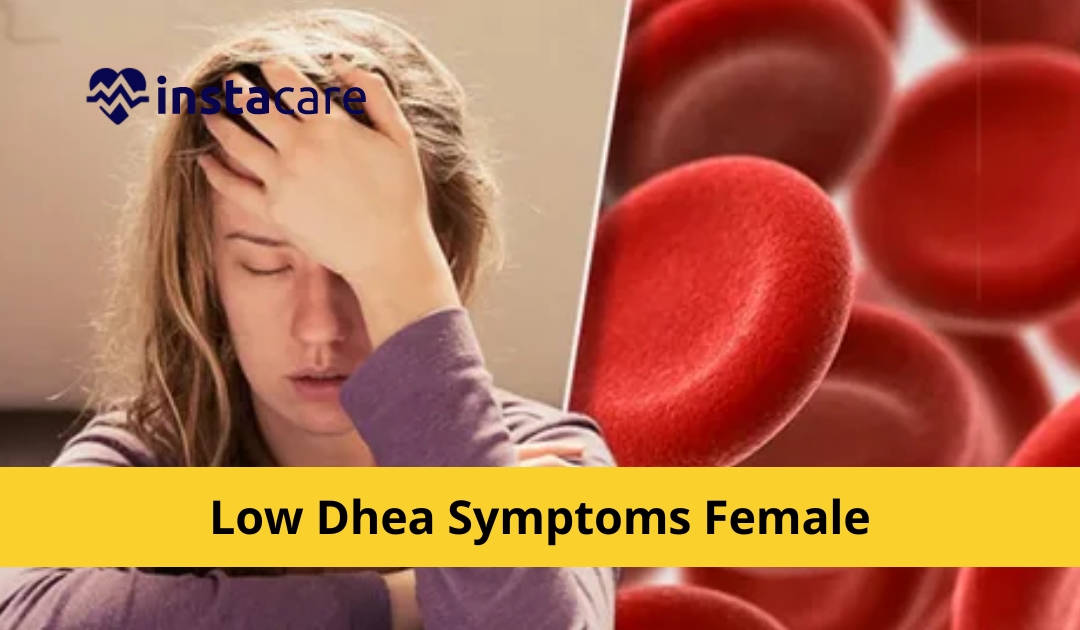Do you feel like your energy levels are constantly depleted? Does it seem like no matter how much sleep and rest you get, it's never enough? If so, there is a chance that the root cause of this exhaustion might be low DHEA levels. DHEA (dehydroepiandrosterone) is an important hormone for both men and women — and especially women who are going through menopause. It helps to regulate energy levels and can have far-reaching effects on overall health when not in balance.
In this blog post, we'll help explain 8 common symptoms of low DHEA in females so that you can identify if it might be contributing to your exhausted feeling. We cover diagnosis options too — as well as other ways to boost your DHEA levels naturally without prescription medications!
What is DHEA?
DHEA, or dehydroepiandrosterone, is a hormone that's naturally produced in our bodies. It can also be synthesized and taken as a dietary supplement. DHEA plays an important role in the body for both men and women. It can help regulate liver function, energize the immune system, and control brain functions such as learning and memory.
Low levels of DHEA are common among older adults, but low levels can cause symptoms in younger adults too – low DHEA symptoms in females include depression, low libido, mood swings, weight gain, fatigue, hair loss, and trouble sleeping. Fortunately, there are natural ways to increase low DHEA levels such as exercise or getting more sleep; however, if these methods do not work well enough then dietary supplements are an option to boost DHEA concentrations back up to their normal range.
What are the symptoms of low DHEA levels?
Low DHEA levels can cause a variety of symptoms in both men and women, but low DHEA levels tend to produce more severe symptoms in women. Common low DHEA symptoms for females include fatigue, weight gain, insomnia, low libido, reduced muscle mass, brain fog and depression.
Other symptoms may include anxiety, low bone density and cognitive decline. When low DHEA levels are left untreated for too long, some of these effects may become chronic. If you suspect that you may have low DHEA levels, it is advisable to visit your doctor and get tested as soon as possible.
1- Depression
Depression affects millions of individuals each year, but low DHEA symptoms in women should not be overlooked. DHEA (Dehydroepiandrosterone) is an important hormone that is endogenous to our bodies, helping us respond to stress and emotion. When low or deficient, the effects of depression can be magnified, leading to low energy, low self-worth, impaired concentration and focus, and difficulty sleeping.
If women are experiencing signs of low DHEA such as unexplained fatigue or even weight gain, they may benefit from speaking with their doctor about possible treatments such as dietary changes and supplements. Depression can be managed with the right care — seeking help sooner rather than later can prevent bigger issues down the road.
2- Weight gain
Weight gain can be an alarm bell indicating low levels of dehydroepiandrosterone (DHEA) in the body, particularly in women. Low DHEA symptoms in females often include low energy, low libido, fatigue, low mood and increased weight gain. The hormone is made naturally by the body and helps blood sugar regulation and mood regulation.
Low DHEA levels therefore can manifest in physical and psychological effects. Eating a healthy balanced diet filled with whole grains, fresh fruits and veggies, protein, healthy fats and complex carbs can all help raise DHEA levels naturally over time. Additionally, aim to engage in plenty of physical activity as this can also increase DHEA levels over time whilst helping to regulate overall weight.
View More: Brown Spotting Instead Of Period
3- Lower sex drive
Low sex drive is becoming increasingly common, even in females that are otherwise healthy. This can be due to low testosterone levels and low DHEA (dehydroepiandrosterone) levels in particular. In these cases, low DHEA symptoms female can include decreased energy, low libido, reduced muscle tone, and fatigue.
Such symptoms may indicate a hormonal imbalance which could be remedied with medical assistance and advice. Additionally, couples may benefit from communication and activities that allow them to connect on a physical level if their low sex drive has hindered their relationship.
4- Memory problems
Memory problems can be caused by a variety of factors, from age-related issues to low levels of the hormone dehydroepiandrosterone (DHEA). Female low DHEA symptoms include forgetfulness, difficulty concentrating, and trouble recalling information.
In addition to these cognitive issues, low DHEA can also manifest as fatigue, low moods, low libido, headaches, and skin problems. If you are experiencing any of these symptoms along with memory issues, visit your doctor to get your hormones tested and discuss potential treatment options with them.
5- Mood Swings
Mood swings are due to drastic fluctuating emotions that can be hard to keep up with; low levels of DHEA in women, a hormone that is crucial for cognitive functioning, can contribute to these shifts. Symptoms of low DHEA in women include fatigue and low libido, as well as decreased strength and physical exercise performance.
Identifying low levels of DHEA hormone is important, as it can help us get closer to understanding our mood swings and managing them more effectively. It's important to speak with your healthcare provider if you feel like you may be experiencing low levels of this hormone, so they can help diagnose the issue and come up with an optimal treatment plan.
6- Vaginal Dryness
Vaginal dryness is a common, but often overlooked, a symptom of low DHEA in women. This low hormone level can be caused by menopause, certain medications, chemotherapy treatments, and conditions such as Sjogren's Syndrome.
Left untreated, low DHEA can cause a lack of vaginal lubrication during sexual intercourse which results in discomfort and pain. Fortunately, this condition is often easily treated with low-dose hormone replacement therapy. However, it is recommended that you speak to your healthcare provider about the best course of action for treating low DHEA and its associated symptoms before beginning any treatment regimen.
7- Psoriasis and inflammation
Psoriasis is a skin condition characterized by red, scaly patches and is caused by overstimulated skin cells growing too quickly. It is not contagious but can be very uncomfortable and sometimes embarrassing. Researchers have discovered that inflammation in the body contributes to the development of psoriasis.
Studies have found that low levels of dehydroepiandrosterone (DHEA) in females often lead to chronic low-grade inflammation which can increase the risk of developing psoriasis as well as triggering existing flares. This low DHEA often has symptoms such as fatigue, low immune system functionality, low sex drive and joint or muscle pain. However, there are treatments available for psoriasis sufferers such as light therapy or medications which help control inflammation and improve overall skin health in combination with lifestyle modifications.
8- Fractures and brittle bones
Fractures and brittle bones can be a sign of low levels of DHEA (Dehydroepiandrosterone) in females. Symptoms associated with low levels of this hormone include low libido, low energy, loss of muscle tone, difficulty sleeping, low bone density, and depression. In addition, low DHEA can lead to an increased risk of fractures and damage to the skeletal system.
To prevent the long-term consequences of low levels of DHEA it is important for women to have their hormone levels checked regularly by their healthcare providers. By making sure that your hormones are balanced you will help your body stay healthy for many years to come.
What happens if your DHEA levels are too low?
Low levels of DHEA, a hormone produced in the adrenal glands, can have a significant impact on your health. Low DHEA symptoms for women may include low libido, fatigue and low fertility. Adrenal gland issues such as Addison’s disease can cause low DHEA levels, however low DHEA is most commonly found to be associated with low fertility.
Women with low DHEA often suffer from hormonal imbalances that can lead to disruption of the endocrine system and interfere with other bodily functions such as mood swings and depression. To maintain healthy DHEA levels and prevent these risks, it is advisable to talk to your doctor who will suggest lifestyle changes and/or hormone replacements.
How to test DHEA levels?
Knowing your DHEA levels is essential in order to stay healthy and optimize your overall well-being. DHEA, also known as Dehydroepiandrosterone, is an important hormone for multiple biological functions, so it’s important to make sure your levels are at their ideal. Low DHEA levels in Females can show symptoms such as low energy, low sex drive, low immunity, and low bone density.
Fortunately, testing your DHEA levels is quite a straightforward process – simply consulting with your doctor will give you the answer! Blood tests are the most common way to test but urine tests can also be effective in some cases. Talk to your health practitioner today about getting a DHEA test done in order to maximize your quality of life!
Can you increase DHEA naturally?
Low levels of the hormone Dehydroepiandrosterone (DHEA) in women can cause a range of physical and emotional symptoms, such as low libido, poor memory, low energy levels and low mood. Fortunately, there are several natural ways to increase your DHEA levels. Increasing your intake of certain vitamins and minerals—including zinc, magnesium and vitamin C—can help boost your DHEA.
Eating more omega-3 fatty acids through fish or legumes can also help keep the production of DHEA on track. In addition, balancing stress hormones like cortisol with regular exercise, adequate sleep and relaxation techniques can all make a positive impact on overall hormone balance and therefore promote higher levels of naturally-occurring DHEA.
Conclusion
In conclusion, low DHEA levels can be more common than we think, but it doesn't have to stop us from leading healthy and balanced life. Women of all ages should keep an eye out for any of the above symptoms that could indicate low DHEA levels. Don’t be afraid to speak with a doctor or specialist if you are worried that you may be dealing with this issue.
Many natural supplements exist that can help boost your body’s production of DHEA, allowing you to maintain normal hormone levels. Taking proactive steps towards improving your overall health will put you in control as well as reduce any uncomfortable symptoms that appear due to hormonal imbalances. So don’t let low DHEA take over your life–take charge and make sure you stay at the peak of your physical and emotional well-being!
Please book an appointment with the best Gynecologist in Lahore, Karachi, Islamabad, and all major cities of Pakistan through InstaCare, or call our helpline at 03171777509 to find the verified doctor for your disease.
Source: https://instacare.pk/blog/symptoms-of-low-dhea-levels-in-female












